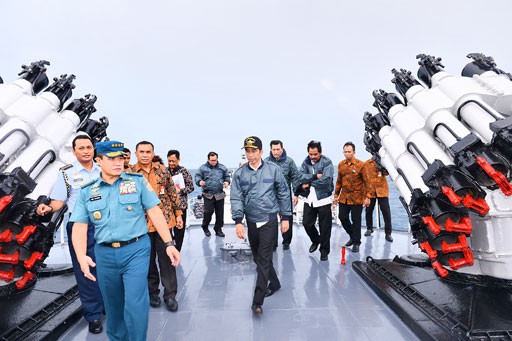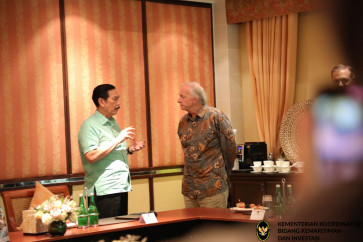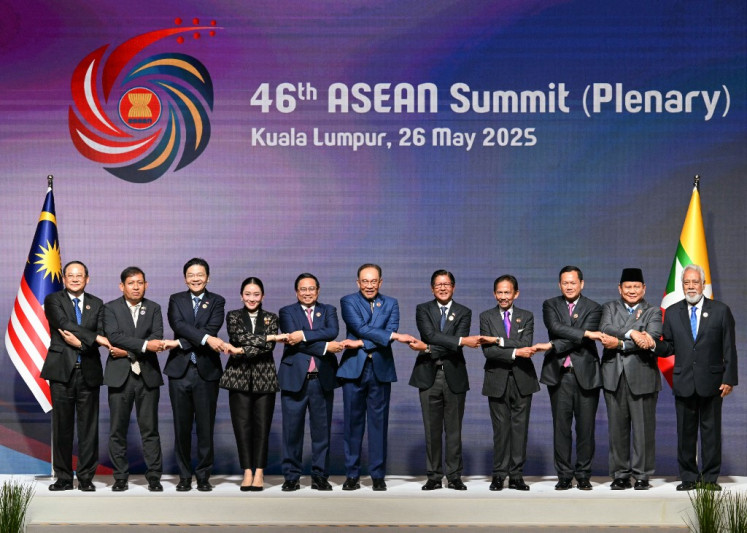SCS: Political-economic vs geopolitical interests
Downplaying the significance of the nine-dash line can no longer serve as Indonesia’s main approach toward China, nor can its self-proclaimed role as an “honest broker”. After the Natuna incident and “the power of maps” of the Natuna waters, as well as the unannounced Chinese People’s Liberation Army’s naval fleet key maneuvers through Indonesian territorial waters, it is questionable whether China really respects Indonesia’s sovereignty.
Change text size
Gift Premium Articles
to Anyone
 On the frontline: President Joko “Jokowi” Widodo (center), accompanied by Navy chief of staff Adm. Ade Supandi (left) and other senior officials, inspects the warship KRI Imam Bonjol 383 after a Cabinet meeting onboard in the Natuna waters, Riau Islands, on Thursday. Of late, Chinese fishing vessels have several times encroached into Indonesia’s Natuna waters to catch fish illegally. (Courtesy Setpres/Krishadiyanto)
On the frontline: President Joko “Jokowi” Widodo (center), accompanied by Navy chief of staff Adm. Ade Supandi (left) and other senior officials, inspects the warship KRI Imam Bonjol 383 after a Cabinet meeting onboard in the Natuna waters, Riau Islands, on Thursday. Of late, Chinese fishing vessels have several times encroached into Indonesia’s Natuna waters to catch fish illegally. (Courtesy Setpres/Krishadiyanto)
T
he Foreign Ministry’s four-paragraph announcement after the Permanent Court of Arbitration in The Hague issued its verdict signified its typically political-economical approach to the South China Sea issue. This was succinctly summarized in Kornelius Purba’s view on the government’s “shut up” order on the subject.
Our investment and financial input from China have become increasingly voluminous, so much so that Coordinating Political, Legal and Security Affairs Minister Luhut Pandjaitan, after meeting the head of the Chinese Communist Party’s central commission for political and legal affairs in China, reportedly said that he had “made an agreement with minister Meng [Jianzhu] not to disclose stories [like the Natuna incident]; we will resolve things under the table.”
This is definitely and extremely underestimating the strategic risk to Indonesia’s sovereignty against the Chinese “power of maps” imposed upon the territorial waters and the exclusive economic zone of Indonesia’s Natunas.
The late foreign minister Ali Alatas’ statement that the Chinese nine-dash line was “not a real map” and that Indonesia could hence claim to be a “non-claimant” state should now be seriously reconsidered.
Downplaying the significance of the nine-dash line can no longer serve as Indonesia’s main approach toward China, nor can its self-proclaimed role as an “honest broker”.
After the Natuna incident and “the power of maps” of the Natuna waters, as well as the unannounced Chinese People’s Liberation Army’s naval fleet key maneuvers through Indonesian territorial waters, it is questionable whether China really respects Indonesia’s sovereignty.
Subhash Kapila of the South Asia Analysis Group recent argument that “the Indonesian military was also disturbed that Indonesian Foreign Ministry’s posture was ignoring the fact that Chinese claim-lines in the South China Sea also impinged on Indonesian waters around the Natuna Islands and it was only a matter of time before China would focus her strategic gaze on the Natuna Islands, as it had done in the Paracel Islands and the Spratly Islands” is an excellent analysis of the position of the Indonesian Military (TNI) and the Defense Ministry versus Indonesia’s Foreign Ministry in the imbroglio around the Natunas.
Three institutions that should be on the frontline of defending Indonesia’s sovereignty are at odds on the sacrosanct principle of Indonesia’s sovereignty.
These sequential developments may be the reason for the appearance of the recent hoax of 10 million Chinese workers coming to Indonesia to seal an ideal cooperation between China and Indonesia on economic projects, as allegedly elaborated by Chinese Vice Prime Minister Liu Yandon at the University of Indonesia’s School of Social Sciences.
It is here that the Foreign Ministry should assert itself as the conspicuous guardian of Indonesia’s sovereignty, playing the delicate balance of geo-politics and political economy in Indonesian national politics.
Foreign Minister Retno LP Marsudi should convince President Joko “Jokowi” Widodo that despite the overwhelming need in Indonesia for Chinese capital and commerce to boost the country’s economy and as such the need to avoid confrontation with China, Indonesia’s sovereignty should incessantly remain at the center of any relationship with China.
As the primus inter pares of ASEAN, Indonesia should be able to provide leadership in facing the consequences of the verdict of the international arbitration court, consolidating ASEAN in the face of Chinese endeavors to disunite it.
These steps should be made systematically, as establishing Indonesia’s global maritime fulcrum cannot be accomplished without the succinct understanding and cooperation of ASEAN. The westernmost part of Indonesia’s maritime highway covers the Straits of Malacca and Singapore and their cooperation is essential to the success of establishing its maritime fulcrum.
Indonesia should also be aware of the Chinese-proposed MOU between China and Indonesia on jointly building the 21st century Maritime Silk Road. The Maritime Silk Road overlays Indonesia’s territorial seas and Indonesia should seriously negotiate its sovereign rights in managing the route through its territorial waters.
The Maritime Silk Road will certainly be beneficial to the development of Indonesia’s desire to become a maritime fulcrum, but it should be acquired on Indonesia’s terms and with Chinese funding. Hard bargaining will unquestionably be necessary to reach a profitable deal for Indonesia.
It is on these crucial substances that the foreign minister and her office need to approach and convince the President that Chinese financial and commercial assistance in building maritime Indonesia should not entail dismissing Indonesia’s sovereign rights.
The delicate balance between political economy and geo-politics in Indonesian foreign and commercial policy should hence be carefully nurtured.
This is the primary task of the foreign minister and her office, in close cooperation with the Defense Ministry, the TNI and the maritime affairs and fisheries minister.
***
The writer is Indonesian foreign policy analyst. His latest book is Masyarakat Asia Tenggara Menuju Komunitas ASEAN 2015 (Southeast Asian Society Bracing for the ASEAN Community 2015), Pustaka Pelajar.
---------------
We are looking for information, opinions, and in-depth analysis from experts or scholars in a variety of fields. We choose articles based on facts or opinions about general news, as well as quality analysis and commentary about Indonesia or international events. Send your piece to community@jakpost.com.








